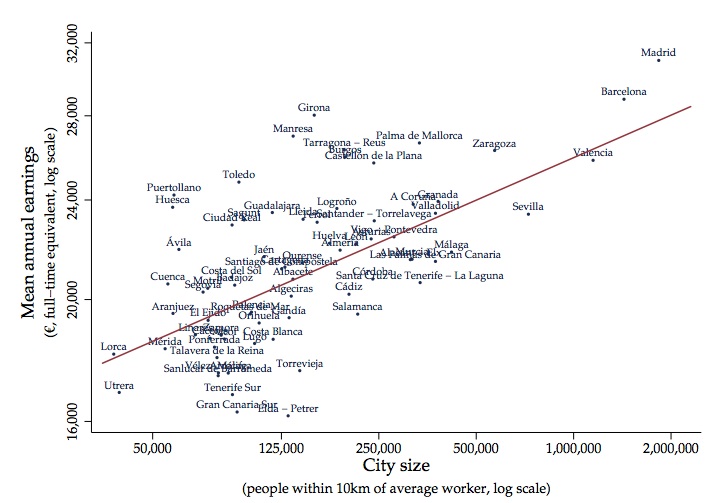De la Roca: Learning by Working in Big Cities
The graph below shows average annual earnings for male workers in Spain by city size. Workers in larger cities earn more than those in smaller cities. The relationship between earnings and city size is not unique to Spain, it’s been documented in other high-income countries as well. It raises an interesting question for urban economists: Why are firms willing to pay more to workers in bigger cities? What productive advantages do they receive to offset the costs of higher wages in bigger cities?

It’s a question that Diego Puga and Jorge De la Roca set out to answer using a large panel data set for workers in Spain. De la Roca, a Research Fellow at NYU’s Furman Center, recently led a brown bag session on their paper, “Learning by Working in Big Cities,” here at the Urbanization Project. The authors suggest three possible reasons that firms would be willing to pay more in bigger cities:
One: There may be static advantages from working in bigger cities. For example, bigger cities may allow for greater specialization and better matching between firms and workers in the labor market.
Two: It may also be the case that higher-ability workers choose to locate bigger cities.
Three: Finally, bigger cities may offer dynamic advantages. For example, by giving workers greater opportunities to interact with a large and diverse set of firms and workers, bigger cities may impart more valuable experience that, over time, leads to higher levels of productivity.
They don’t find much evidence that workers in bigger cities start off with higher ability. Rather, part of the earnings premium in bigger cities is due to static advantages and part to dynamic advantages from learning by working. If a worker in a big city sticks around, he gains more valuable experience in the bigger city than he’d have gained in a smaller city. Unlike the static advantages of a bigger city, this more valuable experience travels with the worker. If he moves to a smaller city, his earnings will therefore be higher than they would have been had he never worked in the bigger city.
In other words, firms pay more for workers in bigger cities because of the static advantages to location and because workers in bigger cities gain more valuable experience and therefore become more productive over time.
De la Roca and Puga also find that higher-ability workers benefit more from learning by working in bigger cities than lower-ability workers. Both higher-ability and lower-ability workers in bigger cities earn more than their smaller city counterparts. But because of the learning differential, the dispersion of income between higher and lower ability workers tends to be higher in bigger cities than in smaller cities.
Find the full paper here (pdf).
